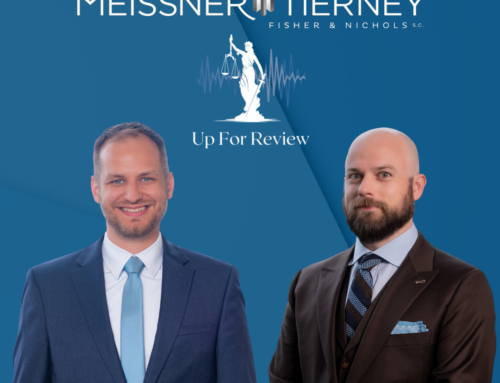It’s time for our monthly check-in on the latest civil law developments at the Wisconsin Supreme Court. In the past month, the court decided five civil cases spanning a broad array of issues including insurance law, eminent domain, and arbitration. Plus, the court granted review in a case touching on taxation and religious liberty. Read on for all the latest.
Cases Decided
Banuelos v. UW Hospitals & Clinics Authority, No. 2020AP1582
Healthcare
Decision Filed: April 4, 2023
Public Citation: 2023 WI 25
For the second time in as many years, the court was called upon to consider the statutory fee restrictions for obtaining copies of healthcare records under Wis. Stat. § 146.83(3f)(b). Last term, the court held the statutory fee schedule does not apply to an independent medical records management firm. This term, the question was whether the fee schedule permits a healthcare provider to charge any fees at all when the patient requests electronic copies of their healthcare records. The court, in an opinion by Justice Ann Walsh Bradley, held that the statute forbids healthcare providers from charging fees for electronic copies of healthcare records because electronic copies are not one of the fees enumerated in the statute. Justice Rebecca Grassl Bradley filed a dissenting opinion, joined by Chief Justice Ziegler and Justice Roggensack, in which she argued that the statute’s silence on fees for electronic records should not be read to prohibit those fees. Justice Roggensack also filed a separate dissent.
Pagoudis v. Keidl, No. 2020AP225
Real Estate
Decision Filed: April 4, 2023
Public Citation: 2023 WI 27
In this case, the court considered who could state a claim against the seller of a home based on alleged defects that were not disclosed in the condition report provided at the time of sale. The court, in a 5-justice majority opinion authored by Justice Karofsky, held that only the LLC that had purchased the property from the seller could state claims for breach of contract and misrepresentation. Neither the sole member of that LLC nor another LLC that later obtained the property had successfully stated claims against the prior homeowner. Notably, this case was initially billed as raising a series of standing questions, but the court determined the arguments before it were more properly characterized as inquiring whether the plaintiffs had stated claims that could survive the motion-to-dismiss standard. Chief Justice Ziegler concurred in an opinion joined by Justice Hagedorn, in part to clarify that she would not adopt the Restatement (Second) of Torts § 533. That section deals with third-person misrepresentation, and the majority saved the question of whether to adopt it for another day. Justice Roggensack and Justice Rebecca Grassl Bradley also filed separate opinions concurring in part and dissenting in part.
ACUITY v. Estate of Michael Shimeta, No. 2020AP189
Insurance
Decision Filed: April 7, 2023
Public Citation: 2023 WI 28
At issue in this auto insurance case was the effect of a reducing clause in an underinsured motorist (UIM) policy. Following an accident caused by an underinsured motorist in which one insured was killed and another injured, Acuity sought a declaration that the proceeds from the underinsured motorist’s insurer applied to reduce both the per-person limit and the per-accident limit in the insureds’ UIM policy. In a 4-3 decision, with Justice Karofsky authoring the majority opinion, the court held that the reducing clause in Acuity’s UIM policy applied only to the per-person limit and not to the per-accident limit. Chief Justice Ziegler and Justice Hagedorn both authored dissenting opinions, both of which were joined by Justice Rebecca Grassl Bradley, arguing that the plain text of the UIM policy reduced both the per-person limit and the per-accident limit.
DEKK Property Development, LLC v. DOT, No. 2020AP2146
Eminent Domain
Decision Filed: April 18, 2023
Public Citation: 2023 WI 30
Wisconsin’s statutes regulating eminent domain proceedings provide different mechanisms to challenge various exercises of the state’s eminent domain power. This case demonstrates the critical importance of bringing an eminent domain challenge under the correct statutory procedure. The state used its eminent domain power to seize a strip of property. Separately, but at the same time, the state closed a driveway on another part of the property. The landowner sued under Wis. Stat. § 32.05(5) to challenge the driveway closure. That section, however, is limited to challenges to takings “described in the jurisdictional offer” challenged. Here, the jurisdictional offer the landowner challenged did not reference the driveway closure but was instead limited to the seizure of the separate strip of property. Because the jurisdictional offer did not reference the driveway, the court held § 32.05(5) was the wrong procedural mechanism to challenge the closure of the driveway. The majority opinion, which was authored by Justice Karofsky, declined to analyze whether the state must compensate the property owner for the driveway closure. Justice Rebecca Grassl Bradley authored a concurring opinion agreeing with the result but clarifying that the majority opinion should not be misconstrued to undermine constitutional property rights.
Green Bay Professional Police Ass’n v. City of Green Bay, No. 2021AP102
Arbitration
Decision Filed: April 27, 2023
Public Citation: 2023 WI 33
The court reviewed whether an arbitrator had manifestly disregarded its authority when it determined that the City of Green Bay had afforded sufficient process to a disciplined police officer and his union. In a six-justice majority opinion authored by Justice Karofsky, the court declined to vacate the arbitral award, explaining that the arbitrator had considered and analyzed the legal standards advanced by the police officer. Under the highly deferential “manifest disregard” standard applied to arbitral decisions, that was enough to avoid vacatur. Chief Justice Ziegler authored a solo concurrence, arguing that the manifest disregard standard is atextual because it does not appear in Wis. Stat. § 788.10, which lists four exclusive bases to set aside an arbitral award. Justice Rebecca Grassl Bradley authored a solo concurrence to clarify the relevant federal due process standards underlying the police officer’s arguments.
Rennick v. Teleflex Medical Inc., No. 2020AP1454
Products Liability
Decision Filed: April 28, 2023
Public Citation: 2023 WI 34
This case represented the court’s first opportunity to consider the “learned intermediary doctrine,” a products liability principle that allows manufacturers of medical devices to satisfy their duty to warn by informing the responsible physician of the risks associated with a device. Sitting with six justices due to the recusal of Justice Dallet, the court split 3-3 and issued a summary decision affirming the court of appeals’ decision without any reasoning. Watch for this issue to return to the court in the near future.
Up for Review
The court did not schedule any oral arguments for May.
New to the Docket
Catholic Charities Bureau, Inc. v. LIRC, No. 2020AP2007
Taxation & First Amendment
Petition for Review Granted: April 18, 2023
The court will consider whether charities affiliated with the Catholic church are “operated primarily for religious purposes” such that they are exempt from participation in the state’s unemployment insurance program under Wis. Stat. § 180.02(15)(h). The charities also state constitutional Free Exercise and Establishment Clause challenges under the United States and Wisconsin constitutions.






